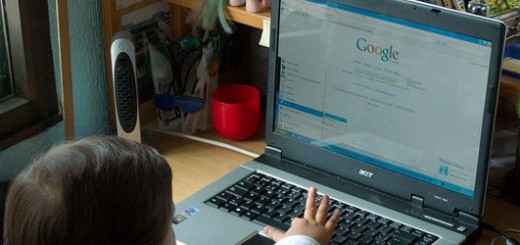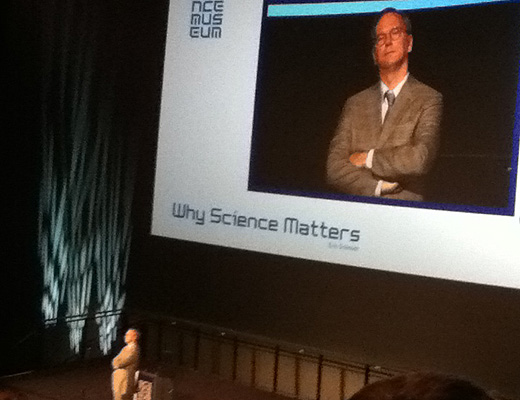
As part of a wide ranging tour, Google’s executive chairman, Eric Schmidt gave a talk at the Science museum in London. Dressed in a smart grey suit and frankly looking pretty unruffled by the heat in the city that evening, Schmidt laid out a few visions of the future for different technological adoption rates, education and the battle for the web.
Schmidt opened by establishing the importance of science and engineering. With an audience of geeks sitting in the Science Museum, this is of course preaching to the choir, but there were interesting and poetic points made.
The Google top man is certainly enamoured with his craft, “Not to deny the importance of art, but we must not deny the importance of science and engineering. You need people to make the instruments. Music may be the food of love but engineers make the instruments.” Fair point, though it can be said that most violin artisans are also musicians. But it’s also fair to agree that culture makes life worth living and technology enables this.
The title of the talk was “Why Science Matters” but it’s possible that ‘Why computer science matters’ would be a more precise version. Schmidt said that there was no more viable seed for growing a new industry than technological innovation. He held up the web as an example and pointed out that the internet is a platform of more than 8% of the UK GDP.
A divided future online
Schmidt is pretty good at delivering stirring statements about the possibilities of the future. “To connect the world is to free the world. The web is much more than a network of machines, it’s a network of minds.” It all started to sound a little tech-utopian, but naturally this is Google, so there’s work to do.
There will be troubles ahead, and part of that is the problem of ‘have and have not’ when it comes to digital access. Schmidt looked at the digital divide of the future as a set of three broad categories; ‘early adopters’, ‘connected contributors’ and the ‘aspiring majority’.
Early adopters are at an advantage. Born in the right place with “a good education, economic prosperity and a democratic government”. Schmidt says that for this group the sky is practically the limit with the only restrictions being what science can offer and what society deems ethical.
He touched upon the future development of the internet of things, “This is world where tiny sensors can be embedded in everything. One estimate is that we’ll end up with about 50 billion such connected devices by 2020. For early adopters, intelligent robots, virtual reality, self driving cars will all be common place. Our cars have already driven more than 200,000 miles. So for this privileged few, science fiction will become a reality and it will redefine the way we live.”
 That sounds pretty neat if you’re a privileged early adopter, but chances are the best of us will fall into categories two and three.
That sounds pretty neat if you’re a privileged early adopter, but chances are the best of us will fall into categories two and three.
The connected contributors group is a much larger one and according to Schmidt, “This is a generation that grew up with increasingly sophisticated technologies as part of their daily lives. A generation born in a household with broadband and multiple computers and equipped with the skills and digital literacy to use them.”
That sounds like a lot of us today. But the Google man had a few ideas about how this middle class could leverage what it has. Although it may not be as rich as the early adopters, they could rent technologies that will be ubiquitous and so innovation will still open up their world.
The third and largest group in the future description is the aspiring majority. At around 5 billion poeple, that’s a huge market and one that technologists must think carefully about approaching.
Schmidt says, “There will be improvements in infrastructure, wire networks will get faster but we cannot imagine the future by extrapolating the past. For the aspiring majority, it’s not going to be dial up and broadband, it will be the smartphone that changes their lives.”

0 Responses
Stay in touch with the conversation, subscribe to the RSS feed for comments on this post.